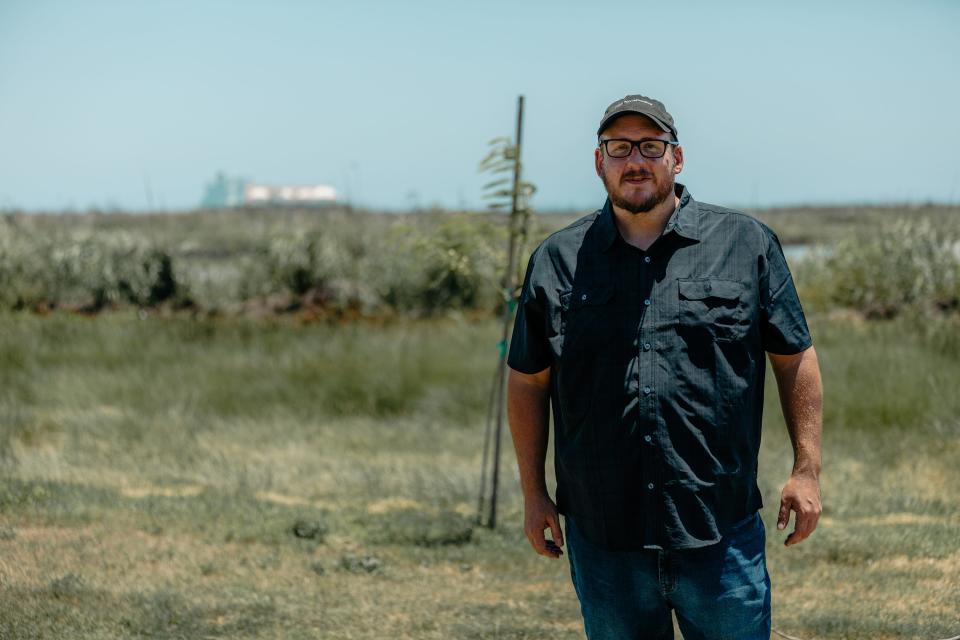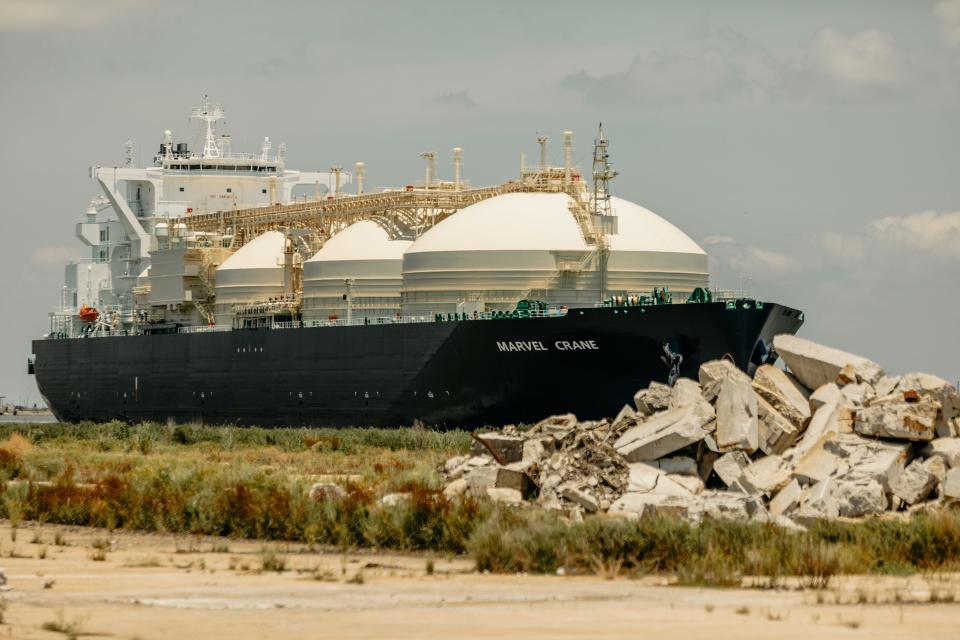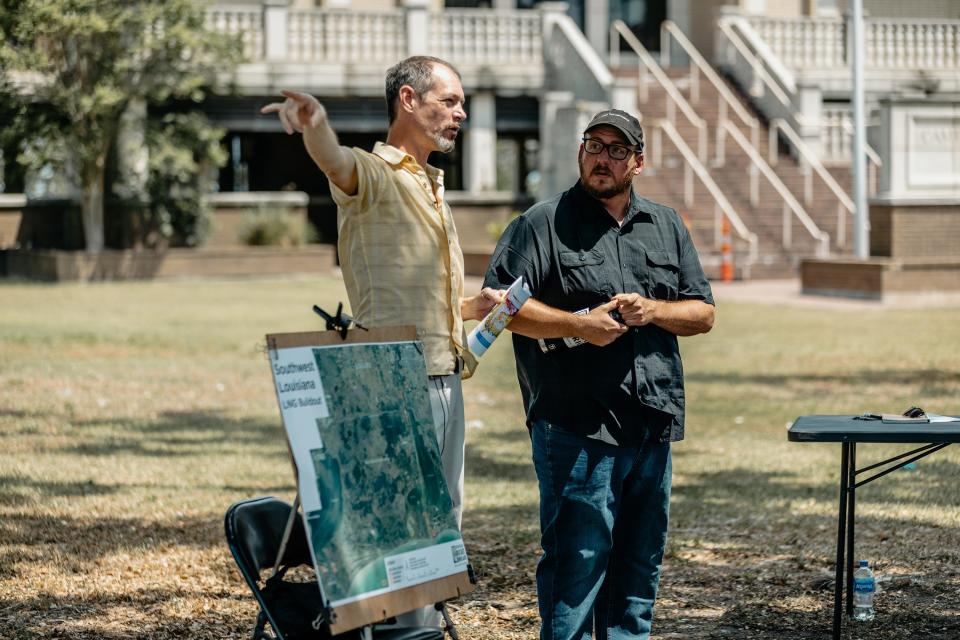Activists push against LNG plants, want renewable energy in southwest Louisiana
CAMERON, Louisiana — In the farthest southwest corner of Louisiana, Cameron Parish shines as a true sportsman's paradise.
It has more than 26 miles of shore on the Gulf of Mexico accessible through Rutherford, Gulf Breeze, Little Florida, Constance, Long-dun, Mae's and Holly beaches.
More than 400 bird species can be seen throughout the year in Cameron Parish. Its marshes are home to brown and white shrimp, blue crab and alligators.
For James Hiatt, Cameron Parish also is one of the best places for fishing. There's a pier that would end at the jetties in the mouth of Calcasieu Pass. Hiatt, who grew up in Lake Charles, would cast his line or just watch the sunset.
But that road is now inaccessible, replaced by Venture Global LNG with a sea wall to protect the Calcasieu Pass liquid natural gas facility, he said.
"You can't get there now," Hiatt said. "Where is anything of a sportsman's paradise? And what happens when industry just takes and doesn't give back?"

Hiatt is part of the Louisiana Bucket Brigade, a statewide nonprofit dedicated to environmental issues. He and other environmental justice advocates want to see Louisiana move away from the petrochemical industry toward cleaner and renewable energy.
They argue that while Cameron Parish is on the frontlines of climate change, the victim of an eroding seascape and more frequent and violent natural disasters, it accelerates the issue by being home to three liquid natural gas sites and planning for more.
'We can't afford to let all of this happen'
There are three liquid natural gas facilities in Cameron and Calcasieu parishes - Sabine Pass, Calcasieu Pass and Cameron LNG.
Liquid natural gas is natural gas that has been cooled to a liquid state making it possible to transport , according to the U.S. Energy Information Administration.
Mike Moncla, president of the Louisiana Oil and Gas Association, said liquid natural gas is one of the cleanest energy sources.
"Our increased reliance on natural gas over the past few years has resulted in the lowest CO2 levels the power sector has seen in nearly three decades," he said in an emailed statement. "The U.S. Energy Information Administration attributes this benefit to the use of natural gas for energy production."
Despite its clean label, plants also leak methane, which contributes to greenhouse warming at a greater intensity than carbon dioxide, according to the Environmental Defense Fund.
Liquid natural gas is critical for global energy and reducing emissions, President of Louisiana Mid-Continent Oil & Gas Association Tommy Faucheux said in an email.
"As we all look to meet climate goals, natural gas, including natural gas transported as LNG, is an essential building block for a cleaner energy future, and as an affordable and low-carbon energy choice," he said.
"Louisiana is uniquely positioned to be a leader in LNG and our industry is committed to investing in protecting our employees, our environment and our communities.”
Louisiana ranks third in the U.S. in natural gas production and accounts for about 9% of the U.S. total marketed natural gas production, according to the U.S. Energy Information Administration. Last year, Louisiana shipped 52% of the nation's liquefied natural gas exports.
"Lake Charles is considered by many to be the LNG capital of America," Moncla said. "The amount of revenue that the LNG industry brings to Lake Charles is what makes the city as strong as it is."
There are plans to expand or create new liquid natural gas facilities in both parishes along the Calcasieu Pass Ship Channel that runs from Lake Charles to the Gulf, according to the Louisiana Bucket Brigade.

"What we're looking at now, today, is an unprecedented amount of pressure to build petrochemical facilities for the refining and liquefaction of gas for exports for international exports," said cartographer Justin Kray, who works with the nonprofit.
"We can't afford to let all of this happen without knowing and internalizing the risks that we're taking," he added. "It's tremendous."
The liquid natural gas plants are causing problems for Cameron and Calcasieu parishes, Kray argued pointing to aerial photos shown by the group indicating erosion to the coastline and sandbars surrounding the plants.
A proposed expansion by Venture Global near the Calcasieu Pass plant would excavate part of Monkey Island. Construction is expected to begin in April. It is expected to bring a $10 billion investment and 1,000 new jobs, Moncla said.
Demand for liquid natural gas is at a 14-year high, he said. Exports from the U.S. have been increasing as Europe looks away from Russia for energy.
"We need LNG now more than ever, and Louisiana has an opportunity to take the lead on LNG exports in a time of global crisis," Moncla said.
Kray also argued that in protecting their own plants from storm surge, which likely reached 15 feet high in 2020 when Hurricane Laura wrecked southwest Louisiana, the plants were pushing the water elsewhere.
Moving toward renewable energy
The Louisiana Bucket Brigade hopes that by pointing out the harm it says the plants have caused to Cameron and Calcasieu parishes, they can prevent future damage.
"At the current stage, we're kind of at a tipping point where three of these plants have been built and are operating," Kray said. "But still, the majority of them are still in the permitting and exploration permitting phase. So there is still opportunity to kind of come to some terms of reckoning."
But part of that means convincing locals that the lucrative jobs that come with the plants can be replaced with something else, preferably renewable energy.
"We need jobs. What we don't need are jobs that are suicidal and will wipe out the coast," Hiatt said. "I'm not saying I have the alternate economic thing figured out, but we're not even moving in that direction. That's the problem.
"We should actually be sprinting towards something different besides a suicidal industry placed directly on one of the most vulnerable coasts that we have."

Hiatt says that knowing the financial benefits the refineries can bring to workers. He was a ship agent, a dock worker, a tank farm operator and a laboratory analyst before leaving the industry.
"The point is, we've got to do something that will transition us away from being so carbon-intensive," he said. "We want electricity. When we turn it on, we want the things to work. But we've got to find a way to do that without continuing to contribute to this global warming that we're experiencing."
Hiatt said the oil companies view southwest Louisiana as a sacrifice zone, a place to destroy while liquid natural gas is a high commodity. He said the companies don't think the people of Cameron and Calcasieu parishes will fight to protect the natural beauty that makes it a sportsman's paradise.
"You ask anybody in Kentucky in a coal mine, you ask people in the Rust Belt, what happens when the industry leaves?
"These places (liquid natural gas plants) are only slated for 30 years, obviously, that's a generation. So maybe they'll be here 30 years. What happens after that when everywhere else has started moving into some renewable and sustainable energy and Louisiana is left holding the bag."
Contact Ashley White at adwhite@theadvertiser.com or on Twitter @AshleyyDi.
This article originally appeared on Lafayette Daily Advertiser: Louisiana Bucket Brigade push for renewable energy in SWLA

